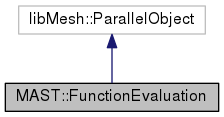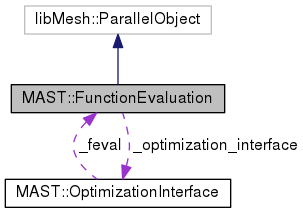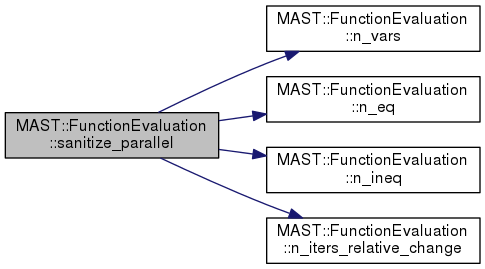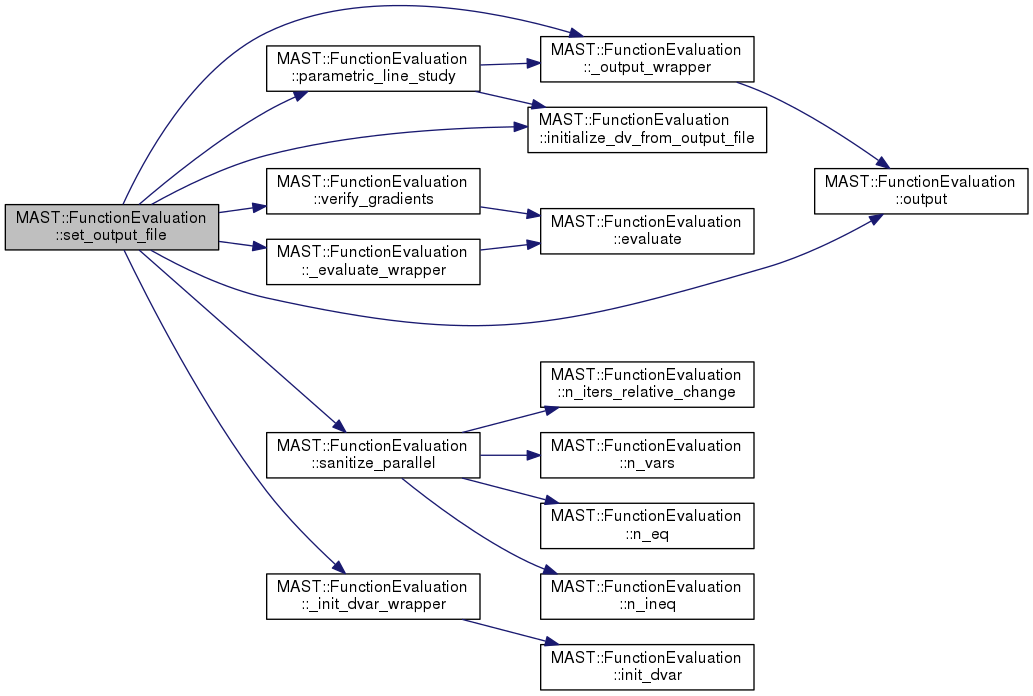|
| | FunctionEvaluation (const libMesh::Parallel::Communicator &comm_in) |
| |
| virtual | ~FunctionEvaluation () |
| |
| void | attach_optimization_interface (MAST::OptimizationInterface &opt) |
| |
| unsigned int | n_vars () const |
| |
| unsigned int | n_eq () const |
| |
| unsigned int | n_ineq () const |
| |
| unsigned int | max_iters () const |
| |
| unsigned int | n_iters_relative_change () const |
| |
| Real | tolerance () const |
| |
| virtual void | init_dvar (std::vector< Real > &x, std::vector< Real > &xmin, std::vector< Real > &xmax)=0 |
| |
| virtual void | evaluate (const std::vector< Real > &dvars, Real &obj, bool eval_obj_grad, std::vector< Real > &obj_grad, std::vector< Real > &fvals, std::vector< bool > &eval_grads, std::vector< Real > &grads)=0 |
| | grads(k): Derivative of f_i(x) with respect to x_j, where k = (j-1)*M + i. More...
|
| |
| void | set_output_file (const std::string &nm) |
| | sets the output file and the function evaluation will write the optimization iterates to this file. More...
|
| |
| virtual void | output (unsigned int iter, const std::vector< Real > &x, Real obj, const std::vector< Real > &fval, bool if_write_to_optim_file) |
| | outputs the the current iterate to libMesh::out, and to the output file if it was set for this rank. More...
|
| |
| void | initialize_dv_from_output_file (const std::string &nm, const unsigned int iter, std::vector< Real > &x) |
| | This reads and initializes the DV vector from a previous optimization history output file. More...
|
| |
| virtual bool | verify_gradients (const std::vector< Real > &dvars) |
| | verifies the gradients at the specified design point More...
|
| |
| virtual void | parametric_line_study (const std::string &nm, const unsigned int iter1, const unsigned int iter2, unsigned int divs) |
| | computes a parametric evaluation along a line from iter1 to iter2 in file nm with divs runs between the two. More...
|
| |
| void | sanitize_parallel () |
| | make sure that the analysis is setup consistently across all parallel processes More...
|
| |
| virtual void | _init_dvar_wrapper (std::vector< Real > &x, std::vector< Real > &xmin, std::vector< Real > &xmax) |
| | This serves as a wrapper around init_dvar() and makes sure that the derived class's implementation provides the same initialization to the design variable vector on all processors. More...
|
| |
| virtual void | _evaluate_wrapper (const std::vector< Real > &dvars, Real &obj, bool eval_obj_grad, std::vector< Real > &obj_grad, std::vector< Real > &fvals, std::vector< bool > &eval_grads, std::vector< Real > &grads) |
| | This serves as a wrapper around evaluate() and makes sure that the derived class's implementation is given the same design variable vector and returns the same values for specific parameters on all processors. More...
|
| |
| virtual void | _output_wrapper (unsigned int iter, const std::vector< Real > &x, Real obj, const std::vector< Real > &fval, bool if_write_to_optim_file) |
| | This serves as a wrapper around evaluate() and makes sure that the derived class's implementation is given the same design variable vector on all processors. More...
|
| |
Definition at line 45 of file function_evaluation.h.
| void MAST::FunctionEvaluation::set_output_file |
( |
const std::string & |
nm | ) |
|
|
inline |
sets the output file and the function evaluation will write the optimization iterates to this file.
If this is not called no file will be created. The user may choose to set different file names on different ranks on the communicator, or set the output only on one of the ranks. Specifying the same filename on multiple ranks will lead to undefined behavior since all ranks will try to write to the same file.
Definition at line 124 of file function_evaluation.h.




















